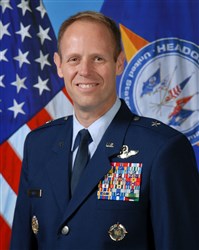
Brigadier General Holt is the Director of Logistics, Headquarters United States European Command, Stuttgart-Vaihingen, Germany. He oversees the direction and management of international agreements and the coordinated logistical support of the United States European Command.
I have the privilege of wearing many hats -- two of which include the U.S. European Command Director of Logistics and the newly-elected Chairman of the Board, Multinational Logistics Coordination Centre, or MLCC. From Dec. 16-18, 2013, I conducted a very productive site visit to the centre in Prague, Czech Republic. The visit gave me the opportunity to set the conditions for improved communications and unity of effort between the MLCC, USEUCOM, and NATO
Before discussing the MLCC visit in greater detail, I want to convey my thanks to two key Czech Armed Forces leaders whom I had the opportunity to meet with during my visit: the Deputy Chief of the General Staff - Chief of Staff, Maj. Gen. Bohuslav Dvorak and Czech General Staff Division of Support Director, Brig. Gen. Vladimir Halenka. Both of these strategic leaders recognized the centre’s important work in promoting international logistics cooperation and interoperability that will enable allies and partner nations to retain many of the interoperability skills learned through the sweat and perseverance required by the International Security Assistance Force mission in Afghanistan.
The MLCC represents the front lines of multinational logistics. It was formed in February 2010 after the Czech Republic, Greece, Hungary, Slovakia, and the U.S. signed a letter of intent a year earlier to support this multinational logistics initiative. Currently, 11 Nations (the original signing five plus Austria, Bosnia and Herzegovina, Croatia, Georgia, Poland and the United Kingdom) support the coordination centre and have a formal memorandum of understanding that defines their participation and membership. Nine additional nations are currently pursuing membership in the MLCC.

Brigadier Gen. Blaine Holt, director, U.S. European Command Directorate of Logistics (sixth from left) poses with Czech Republic Army Col. Miroslav Pelikan , Director, Multinational Logistics Coordination Centre, or MLCC, (to Gen. Holt’s left) during the General’s a visit to the centre in Prague, Czech Republic, Dec. 16-18, 2013.The MLCC represents the front lines of multinational logistics and has the ability to bring together strategic partners to participate or observe in multinational logistics exercises.
Operating as an MOU-organization gives the centre the ability to invite allies, Partnership for Peace nations, and other strategic partners to participate or observe in multinational logistics exercises. By not restricting the exercise to only allies and Partnership for Peace nations, the MLCC achieved unequaled success in bringing together 35 nations, including more than 1,700 service members and civilians, as part of Capable Logistician 2013 held in Lest, Slovakia. The exercise served as a logistics standardization and interoperability field training exercise. Participating nations contributed logistics assets organized by function into 17 multinational integrated logistics units. A multinational joint logistics support group, or JLSG, staff provided the command and control of the units. The exercise utilized a crisis response operation, peace keeping and humanitarian assistance scenario.
As the MLCC considers the shape and training audience for the next Capable Logistician exercise planned for summer of 2015, or CL15, I will be encouraging further national membership into the coordination centre and participation in the next exercise. Additionally, as the director of the USEUCOM Logistics Directorate, I will be encouraging component participation in CL15 and training elements of my staff to serve on the JLSG during the exercise. The coordination centre is on the forefront of assisting nations to work together to provide efficient logistics support. Every nation and USEUCOM component would benefit greatly by participating in this exercise, so as not to miss a tremendous opportunity to retain much of the hard-earned interoperability lessons learned during ISAF participation.
This exercise also presents an opportunity for USEUCOM to expand our interagency/whole of government participation. With a disaster relief scenario, CL15 may provide the command the ability to introduce non-Department of Defense participants to interact with the JLSG while informing the coordination centre of realistic demands common to disaster relief operations.
During my visit to Prague, I learned even more about how the MLCC is also filling the gap to advance NATO Smart Defence Projects by hosting workshops and advancing dialogue between nations on these important topics. The coordination centre correctly focuses on the following key Smart Defence focus areas: fuel handling; water purification and distribution; multinational logistics; maintenance; and ammo storage.
On top of exercise planning and Smart Defence workshops, the MLCC serves as a central hub for coordination of logistics education and training. In order to prepare participants for Capable Logistician, the coordination centre provides JLSG training and is linked to the NATO School at Oberammergau, Germany, for training on reception; staging and onward movement; host nation support planning; and movement and logistics operational planning. As chairman of the coordination centre’s board of directors, I intend to gain broader participation in these important MLCC and NATO-led courses.
Finally, let me finish this post by thanking two great professionals who were instrumental in the success of my visit to Prague: the U.S. Defense Attaché, Col. Patrick Sullivan, and the Chief, USEUCOM Policy, Strategy, Partnering, and Capabilities Directorate Office of Defense Cooperation for the Czech Republic, Lt. Col. Stephanie Bagley. Patrick and Stephanie are on top of their game and offer tremendous insight into the political and military situation of the Czech Republic.




